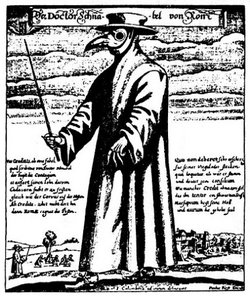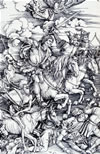The Medieval World
Medieval World Information
News
- coming soon
Links
Site Info
Welcome, Guest
Black Death
Introduction

According to Platt, the critical fact of the impact of the Black Death was that "England from 1400 was half empty." The effect of the plague in reducing in population has been seen by several historians - with some reservations - as possibly the major contributory factor in shaping the political development of the early modern period. Thus social injustice and the institutions of villeinage were high on the list of casualties of the Black Death according to Platt.
Main Impact
Before the plague throughout the 12th and 13th centuries, there had been a sustained growth in both population and economy, according to Ormrod. Population growth may have outstripped agricultural productive capacity, so that the famines of 1316/7 and 1321/2 brought widespread distress and death. The large population brought pressure on land, high demand for food, high prices in the market, giving landholders the advantage over peasants. It encouraged them to manage their estates directly. It made it easy to apply oppressive social relations that tied peasants to their land. The landless knight class were without a clear social peacetime role and were engaged in frequent wars abroad, lest they become a danger to stability at home.
The Black Death of 1348/9 and the following plagues were so destructive that the population of the 1370s was between half and two thirds of its former size. For most of the next century the population of England stayed at only 2 or 3 million.
This had a dramatic impact on the balance of the medieval classes, with the peasantry and gentry gaining much more of an upper hand than previously.
For example, with the easing of pressure on land and food, rural rents fell, leaving more opportunity for peasant accumulation. Increased peasant wealth and shortage of labour meant that rural landholders found it increasingly expensive to hire rural labour and increasingly difficult to impose oppressive social tenure institutions of rural bondage.
Both rural and urban landholders increasingly came to employ resident servants, it being cheaper to house and feed servants than to pay labourer's rates in a time of shortage. Typically, among the poor, both men and women were likely to work as servants for about ten years before they had saved enough to set-up their own holdings.
As a result, there were also changes in the marriage patterns of the poor, with later marriage and therefore fewer children per family. This in itself may have contributed further to the decline in population, first brought about by the Black Death. So, one cannot ignore the other factors leading to population decline and then stability at a much lower level than the previous 2 centuries.
The landholders came to see that their best chance of continuing to profit from land would be to cease direct engagement in agriculture and to lease it. This helped to create a new role for landless knights and other gentry.
The political effects of the Black Death seem to have been somewhat contradictory. Briefly, it appears that, after the newly more powerful poorer classes flexed their political muscle, in a few revolts during the disruption of the traditional stability of feudal relations, the ruling classes gave way to increasing demands for popular participation and a long period of political stability that lasted until the early modern period ensued.
A new class of officials from the landless gentry emerged in the towns. Where they tended to be unpopular, seen as collectors of unjust taxes and enforcers of unpopular laws, there was evidence of revolt, with increasingly populist measures being implemented (e.g Beverley in 1381.) Platt argued that nearby Kingston on Hull avoided such revolts in this period by incorporating popular participation into its constitution, indicating that fair government was the rebels' main objective.
Conclusion
The Black Death decimated the population of Britain. This changed the pattern of relations between classes over the next 2 hundred years, helping to stabilise the pattern of feudal relations by making them less oppressive on the poor, introducing a level of popular participation in local and national government, setting in train the rise of a political class of gentry which was to challenge the political power of the lords and shape the development of the British Parliament.
Image licensed under the GNU Free Documentation License. You may copy it as long as it remains under this license and you provide a link to www.gnu.org/copyleft/fdl.html.

